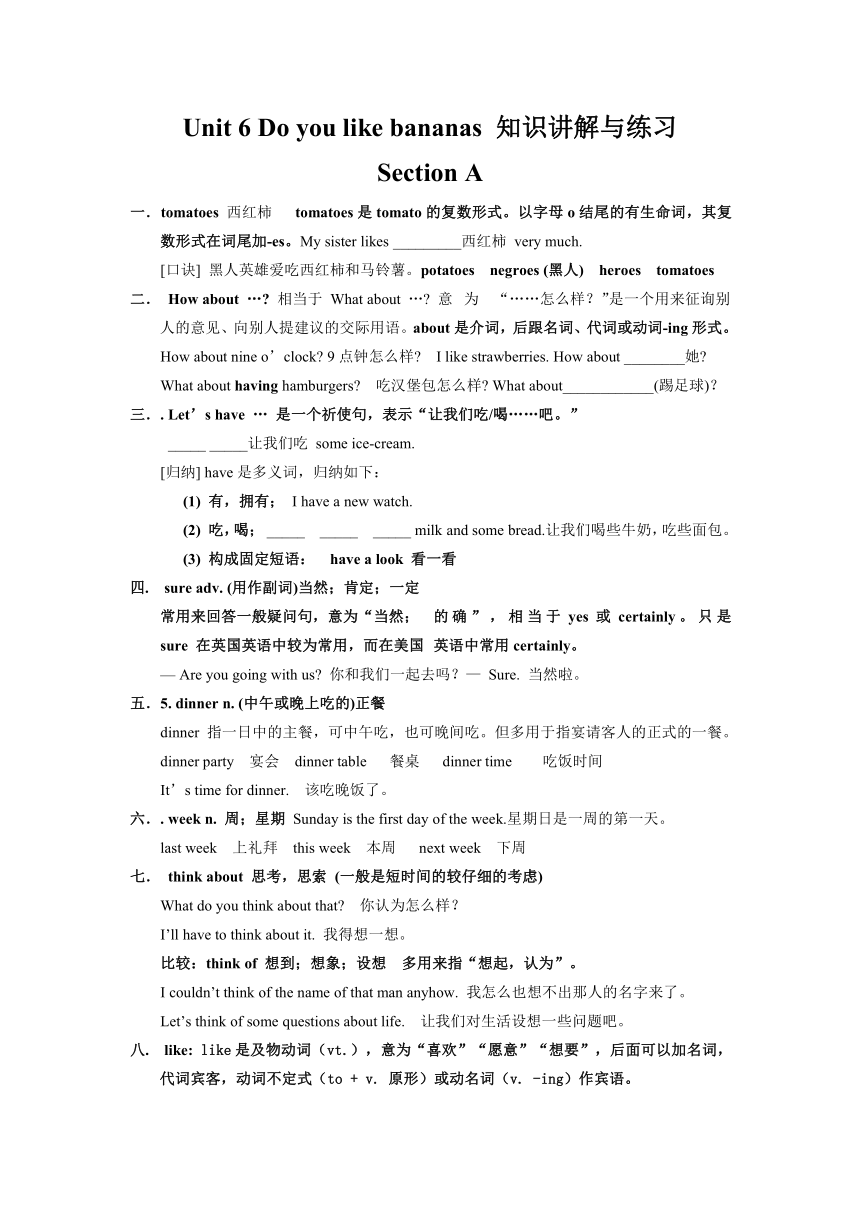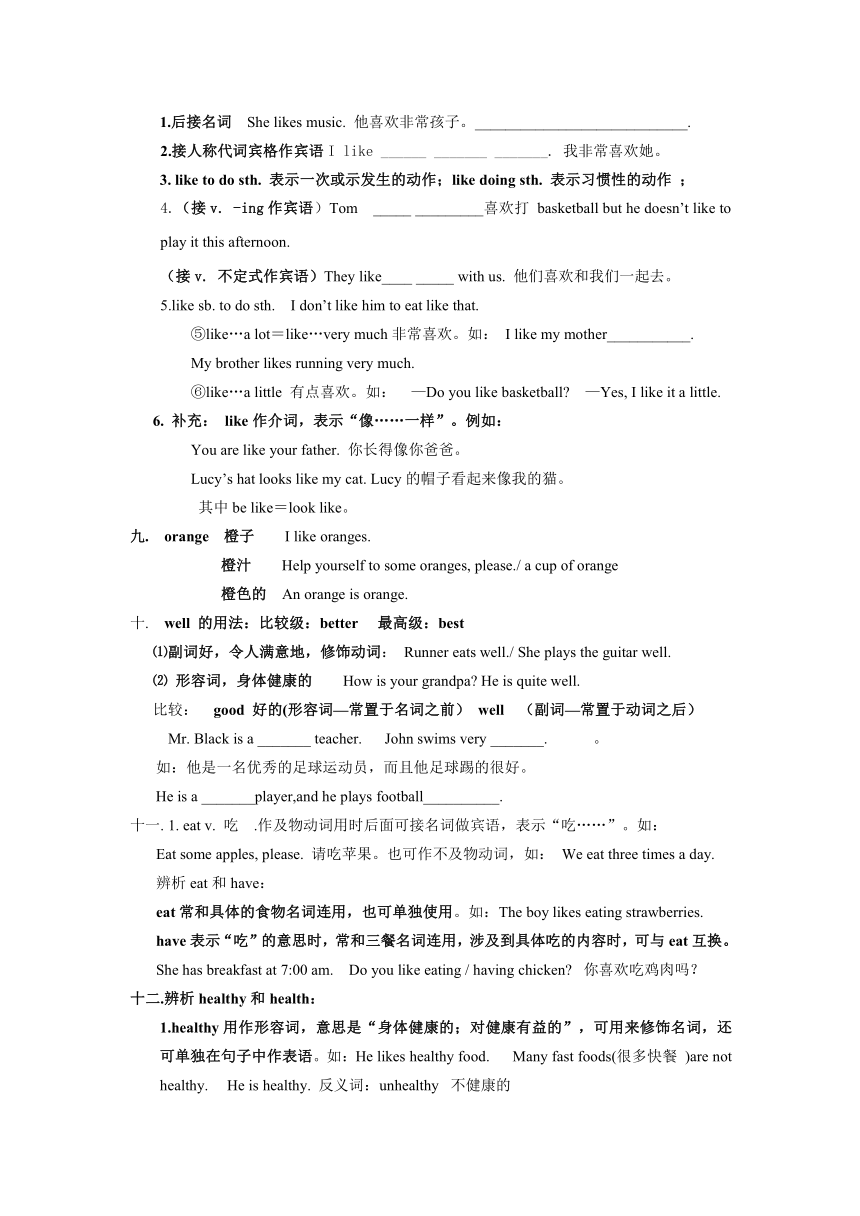Unit 6 Do you like bananas? 知识讲解与练习
文档属性
| 名称 | Unit 6 Do you like bananas? 知识讲解与练习 |  | |
| 格式 | zip | ||
| 文件大小 | 16.7KB | ||
| 资源类型 | 教案 | ||
| 版本资源 | 人教新目标(Go for it)版 | ||
| 科目 | 英语 | ||
| 更新时间 | 2013-11-21 21:37:17 | ||
图片预览


文档简介
Unit 6 Do you like bananas 知识讲解与练习
Section A
一.tomatoes 西红柿 tomatoes是tomato的复数形式。以字母o结尾的有生命词,其复数形式在词尾加-es。My sister likes _________西红柿 very much.
[口诀] 黑人英雄爱吃西红柿和马铃薯。potatoes negroes (黑人) heroes tomatoes
二. How about …? 相当于 What about …? 意 为 “……怎么样?”是一个用来征询别人的意见、向别人提建议的交际用语。about是介词,后跟名词、代词或动词-ing形式。
How about nine o’clock? 9点钟怎么样? I like strawberries. How about ________她?
What about having hamburgers? 吃汉堡包怎么样? What about____________(踢足球)?
三.. Let’s have … 是一个祈使句,表示“让我们吃/喝……吧。”
_____ _____让我们吃 some ice-cream.
[归纳] have是多义词,归纳如下:
(1) 有,拥有; I have a new watch.
(2) 吃,喝; _____ _____ _____ milk and some bread.让我们喝些牛奶,吃些面包。
(3) 构成固定短语: have a look 看一看
四. sure adv. (用作副词)当然;肯定;一定
常用来回答一般疑问句,意为“当然; 的确”,相当于yes或certainly。只是 sure 在英国英语中较为常用,而在美国 英语中常用certainly。
— Are you going with us? 你和我们一起去吗?— Sure. 当然啦。
五.5. dinner n. (中午或晚上吃的)正餐
dinner 指一日中的主餐,可中午吃,也可晚间吃。但多用于指宴请客人的正式的一餐。
dinner party 宴会 dinner table 餐桌 dinner time 吃饭时间
It’s time for dinner. 该吃晚饭了。
六.. week n. 周;星期 Sunday is the first day of the week.星期日是一周的第一天。
last week 上礼拜 this week 本周 next week 下周
七. think about 思考,思索 (一般是短时间的较仔细的考虑)
What do you think about that? 你认为怎么样?
I’ll have to think about it. 我得想一想。
比较:think of 想到;想象;设想 多用来指“想起,认为”。
I couldn’t think of the name of that man anyhow. 我怎么也想不出那人的名字来了。
Let’s think of some questions about life. 让我们对生活设想一些问题吧。
八. like: like是及物动词(vt.),意为“喜欢”“愿意”“想要”,后面可以加名词,代词宾客,动词不定式(to + v. 原形)或动名词(v. -ing)作宾语。
1.后接名词 She likes music. 他喜欢非常孩子。____________________________.
2.接人称代词宾格作宾语I like ______ _______ _______. 我非常喜欢她。
3. like to do sth. 表示一次或示发生的动作;like doing sth. 表示习惯性的动作 ;
4.(接v. -ing作宾语)Tom _____ _________喜欢打 basketball but he doesn’t like to play it this afternoon.
(接v. 不定式作宾语)They like____ _____ with us. 他们喜欢和我们一起去。
5.like sb. to do sth. I don’t like him to eat like that.
⑤like…a lot=like…very much非常喜欢。如: I like my mother___________.
My brother likes running very much.
⑥like…a little 有点喜欢。如: —Do you like basketball? —Yes, I like it a little. 6. 补充: like作介词,表示“像……一样”。例如:
You are like your father. 你长得像你爸爸。
Lucy’s hat looks like my cat. Lucy的帽子看起来像我的猫。
其中be like=look like。
九. orange 橙子 I like oranges.
橙汁 Help yourself to some oranges, please./ a cup of orange
橙色的 An orange is orange.
十. well 的用法:比较级:better??? 最高级:best
⑴副词好,令人满意地,修饰动词: Runner eats well./ She plays the guitar well.
⑵ 形容词,身体健康的 How is your grandpa? He is quite well.
比较: good 好的(形容词—常置于名词之前) well (副词—常置于动词之后)
Mr. Black is a _______ teacher. John swims very _______. 。
如:他是一名优秀的足球运动员,而且他足球踢的很好。
He is a _______player,and he plays football__________.
十一. 1. eat v. 吃 .作及物动词用时后面可接名词做宾语,表示“吃……”。如:
Eat some apples, please. 请吃苹果。也可作不及物动词,如: We eat three times a day.
辨析eat和have:
eat常和具体的食物名词连用,也可单独使用。如:The boy likes eating strawberries.
have表示“吃”的意思时,常和三餐名词连用,涉及到具体吃的内容时,可与eat互换。
She has breakfast at 7:00 am. Do you like eating / having chicken?? 你喜欢吃鸡肉吗?
十二.辨析healthy和health:
1.healthy用作形容词,意思是“身体健康的;对健康有益的”,可用来修饰名词,还可单独在句子中作表语。如:He likes healthy food. Many fast foods(很多快餐 )are not healthy.? He is healthy. 反义词:unhealthy???不健康的
health用作名词,意为“健康;健康状态”。 在句中可做主语或宾语。如:
His health is not good.? 他的健康状况不佳。
Vegetables are good for your health.? 蔬菜有益于你的健康。
Eating ___________food is good for our_________.
十三. I like chicken for dinner. 晚饭我喜欢鸡肉。
1. “like + 食品名词 + for + 某餐”表示“某人 喜欢吃什么”。如:
— What _____ you_____ _____ dinner? 晚饭你喜欢吃什么?
— I like vegetables and rice for dinner. 晚饭我喜欢蔬菜和米饭。
She _____ bread and milk _____ breakfast. 早餐他喜欢牛奶和面包。
2. for是介词prep. ??(表示目的)为了;因为;至于;对于;适合于后跟名词或代词宾格
for lunch?… ???至于午饭……
For_____, English is very important. 对于我们来说,英语是非常重要的。
晚饭他喜欢吃鸡肉。 He likes chicken__________.
十四. eating habits 饮食习惯
eating habits 意为“饮食习惯”,其中eating是动名词作定语,修饰habits。类似短语还有: swimming pool 游泳池 reading room 阅览室 ?running star 跑步明星
十五. 6. breakfast的用法
(1)泛指“早饭”,前面不加冠词,例如:
At what time do you have breakfast? 你什么时候吃早点?
Chinese have porridge(粥) for breakfast. 中国人早饭吃粥。
(2)如果breakfast有修饰词,前面通常加不定冠词“a”。例如:
He had a quick breakfast this morning. 他今天早餐吃得很快。
(3)have sth. for breakfast. 早餐吃……
注:以上用法通用于lunch和supper,另外“吃早(午,晚)餐”常用have breakfast/lunch/supper。
十六. want 用作动词,意为“要;想要”,其常见 用法如下:
1. want sth. 想要某物I want some rice. 我想要些米饭。
2. want to do sth. 想要去做某事 She ______ ___ _____ a question. 她想问个问题。
3. want sb. to do sth. 想要某人去做某事
Jack _______ _____ to go to school with _____. 杰克想让我和他一起去上学。
1)我想变得健康。 I want______ ____ healthy.
2)我想成为一名好学生. I ______ _____ _____a good student.
十七. really adv. 真正地
主要用于强调与事实或现实不相违背,也可表示不快、惊奇或某种含蓄的怀疑。
It’s really cold today. 今天可真冷。Did he really say so? 他真的那样说吗?
十八.question n. 问题
no question 毫无疑问 answer the question 回答这个问题
通常指用口头或书面提出来要求回答或有待讨论解决的问题。
练习: 选词填空。(breakfast, eat, healthy, well, real )
1. Dave’s brother plays soccer very _____. 2. For __________, what does she like?
3. Ice-cream is not good. Let’s eat some _______ food.
4. I’m hungry (饥饿的). Can I ____ some bread? 5. — Do you___ like hamburgers?
十九. what about?意为“……怎么样?”用于提建议,后面接名词或是动词加-ing。
如:— What about this skirt? ??这条裙子怎么样?— It’s very beautiful.? ?它很漂亮。
How about__________the piano? 弹钢琴怎么样?
二十. David asks the volleyball star, Cindy Smith, about her eating habits.
大卫问排球明星,辛迪·史密斯,关于她的饮食习惯的问题。
同位语:一个名词对另一个名词或代词进行修饰,限定或说明,这个名词就是同位语。同位语与被它限定的词的格要一致,并常常紧挨在一起。如:
Mr. Smith, our new teacher, is interesting.
(our new teacher是Mr. Smith的同位语,同位语和被限定的成分之间一般要用逗号隔开。)
His brother John is a teacher. (John是brother的同位语,同位语和被限定的成分都是单个单词,同位成分之间不用逗号隔开。)
Section A
一.tomatoes 西红柿 tomatoes是tomato的复数形式。以字母o结尾的有生命词,其复数形式在词尾加-es。My sister likes _________西红柿 very much.
[口诀] 黑人英雄爱吃西红柿和马铃薯。potatoes negroes (黑人) heroes tomatoes
二. How about …? 相当于 What about …? 意 为 “……怎么样?”是一个用来征询别人的意见、向别人提建议的交际用语。about是介词,后跟名词、代词或动词-ing形式。
How about nine o’clock? 9点钟怎么样? I like strawberries. How about ________她?
What about having hamburgers? 吃汉堡包怎么样? What about____________(踢足球)?
三.. Let’s have … 是一个祈使句,表示“让我们吃/喝……吧。”
_____ _____让我们吃 some ice-cream.
[归纳] have是多义词,归纳如下:
(1) 有,拥有; I have a new watch.
(2) 吃,喝; _____ _____ _____ milk and some bread.让我们喝些牛奶,吃些面包。
(3) 构成固定短语: have a look 看一看
四. sure adv. (用作副词)当然;肯定;一定
常用来回答一般疑问句,意为“当然; 的确”,相当于yes或certainly。只是 sure 在英国英语中较为常用,而在美国 英语中常用certainly。
— Are you going with us? 你和我们一起去吗?— Sure. 当然啦。
五.5. dinner n. (中午或晚上吃的)正餐
dinner 指一日中的主餐,可中午吃,也可晚间吃。但多用于指宴请客人的正式的一餐。
dinner party 宴会 dinner table 餐桌 dinner time 吃饭时间
It’s time for dinner. 该吃晚饭了。
六.. week n. 周;星期 Sunday is the first day of the week.星期日是一周的第一天。
last week 上礼拜 this week 本周 next week 下周
七. think about 思考,思索 (一般是短时间的较仔细的考虑)
What do you think about that? 你认为怎么样?
I’ll have to think about it. 我得想一想。
比较:think of 想到;想象;设想 多用来指“想起,认为”。
I couldn’t think of the name of that man anyhow. 我怎么也想不出那人的名字来了。
Let’s think of some questions about life. 让我们对生活设想一些问题吧。
八. like: like是及物动词(vt.),意为“喜欢”“愿意”“想要”,后面可以加名词,代词宾客,动词不定式(to + v. 原形)或动名词(v. -ing)作宾语。
1.后接名词 She likes music. 他喜欢非常孩子。____________________________.
2.接人称代词宾格作宾语I like ______ _______ _______. 我非常喜欢她。
3. like to do sth. 表示一次或示发生的动作;like doing sth. 表示习惯性的动作 ;
4.(接v. -ing作宾语)Tom _____ _________喜欢打 basketball but he doesn’t like to play it this afternoon.
(接v. 不定式作宾语)They like____ _____ with us. 他们喜欢和我们一起去。
5.like sb. to do sth. I don’t like him to eat like that.
⑤like…a lot=like…very much非常喜欢。如: I like my mother___________.
My brother likes running very much.
⑥like…a little 有点喜欢。如: —Do you like basketball? —Yes, I like it a little. 6. 补充: like作介词,表示“像……一样”。例如:
You are like your father. 你长得像你爸爸。
Lucy’s hat looks like my cat. Lucy的帽子看起来像我的猫。
其中be like=look like。
九. orange 橙子 I like oranges.
橙汁 Help yourself to some oranges, please./ a cup of orange
橙色的 An orange is orange.
十. well 的用法:比较级:better??? 最高级:best
⑴副词好,令人满意地,修饰动词: Runner eats well./ She plays the guitar well.
⑵ 形容词,身体健康的 How is your grandpa? He is quite well.
比较: good 好的(形容词—常置于名词之前) well (副词—常置于动词之后)
Mr. Black is a _______ teacher. John swims very _______. 。
如:他是一名优秀的足球运动员,而且他足球踢的很好。
He is a _______player,and he plays football__________.
十一. 1. eat v. 吃 .作及物动词用时后面可接名词做宾语,表示“吃……”。如:
Eat some apples, please. 请吃苹果。也可作不及物动词,如: We eat three times a day.
辨析eat和have:
eat常和具体的食物名词连用,也可单独使用。如:The boy likes eating strawberries.
have表示“吃”的意思时,常和三餐名词连用,涉及到具体吃的内容时,可与eat互换。
She has breakfast at 7:00 am. Do you like eating / having chicken?? 你喜欢吃鸡肉吗?
十二.辨析healthy和health:
1.healthy用作形容词,意思是“身体健康的;对健康有益的”,可用来修饰名词,还可单独在句子中作表语。如:He likes healthy food. Many fast foods(很多快餐 )are not healthy.? He is healthy. 反义词:unhealthy???不健康的
health用作名词,意为“健康;健康状态”。 在句中可做主语或宾语。如:
His health is not good.? 他的健康状况不佳。
Vegetables are good for your health.? 蔬菜有益于你的健康。
Eating ___________food is good for our_________.
十三. I like chicken for dinner. 晚饭我喜欢鸡肉。
1. “like + 食品名词 + for + 某餐”表示“某人 喜欢吃什么”。如:
— What _____ you_____ _____ dinner? 晚饭你喜欢吃什么?
— I like vegetables and rice for dinner. 晚饭我喜欢蔬菜和米饭。
She _____ bread and milk _____ breakfast. 早餐他喜欢牛奶和面包。
2. for是介词prep. ??(表示目的)为了;因为;至于;对于;适合于后跟名词或代词宾格
for lunch?… ???至于午饭……
For_____, English is very important. 对于我们来说,英语是非常重要的。
晚饭他喜欢吃鸡肉。 He likes chicken__________.
十四. eating habits 饮食习惯
eating habits 意为“饮食习惯”,其中eating是动名词作定语,修饰habits。类似短语还有: swimming pool 游泳池 reading room 阅览室 ?running star 跑步明星
十五. 6. breakfast的用法
(1)泛指“早饭”,前面不加冠词,例如:
At what time do you have breakfast? 你什么时候吃早点?
Chinese have porridge(粥) for breakfast. 中国人早饭吃粥。
(2)如果breakfast有修饰词,前面通常加不定冠词“a”。例如:
He had a quick breakfast this morning. 他今天早餐吃得很快。
(3)have sth. for breakfast. 早餐吃……
注:以上用法通用于lunch和supper,另外“吃早(午,晚)餐”常用have breakfast/lunch/supper。
十六. want 用作动词,意为“要;想要”,其常见 用法如下:
1. want sth. 想要某物I want some rice. 我想要些米饭。
2. want to do sth. 想要去做某事 She ______ ___ _____ a question. 她想问个问题。
3. want sb. to do sth. 想要某人去做某事
Jack _______ _____ to go to school with _____. 杰克想让我和他一起去上学。
1)我想变得健康。 I want______ ____ healthy.
2)我想成为一名好学生. I ______ _____ _____a good student.
十七. really adv. 真正地
主要用于强调与事实或现实不相违背,也可表示不快、惊奇或某种含蓄的怀疑。
It’s really cold today. 今天可真冷。Did he really say so? 他真的那样说吗?
十八.question n. 问题
no question 毫无疑问 answer the question 回答这个问题
通常指用口头或书面提出来要求回答或有待讨论解决的问题。
练习: 选词填空。(breakfast, eat, healthy, well, real )
1. Dave’s brother plays soccer very _____. 2. For __________, what does she like?
3. Ice-cream is not good. Let’s eat some _______ food.
4. I’m hungry (饥饿的). Can I ____ some bread? 5. — Do you___ like hamburgers?
十九. what about?意为“……怎么样?”用于提建议,后面接名词或是动词加-ing。
如:— What about this skirt? ??这条裙子怎么样?— It’s very beautiful.? ?它很漂亮。
How about__________the piano? 弹钢琴怎么样?
二十. David asks the volleyball star, Cindy Smith, about her eating habits.
大卫问排球明星,辛迪·史密斯,关于她的饮食习惯的问题。
同位语:一个名词对另一个名词或代词进行修饰,限定或说明,这个名词就是同位语。同位语与被它限定的词的格要一致,并常常紧挨在一起。如:
Mr. Smith, our new teacher, is interesting.
(our new teacher是Mr. Smith的同位语,同位语和被限定的成分之间一般要用逗号隔开。)
His brother John is a teacher. (John是brother的同位语,同位语和被限定的成分都是单个单词,同位成分之间不用逗号隔开。)
同课章节目录
- starters 预备篇(2012秋审查)
- Unit 1 Good morning !
- Unit 2 What’s this in English?
- Unit 3 What color is it ?
- Unit 1 My name's Gina.
- Section A
- Section B
- Unit 2 This is my sister.
- Section A
- Section B
- Unit 3 Is this your pencil?
- Section A
- Section B
- Unit 4 Where's my schoolbag?
- Section A
- Section B
- Unit 5 Do you have a soccer ball?
- Section A
- Section B
- Unit 6 Do you like bananas?
- Section A
- Section B
- Unit 7 How much are these socks?
- Section A
- Section B
- Unit 8 When is your birthday?
- Section A
- Section B
- Unit 9 My favorite subject is science.
- Section A
- Section B
